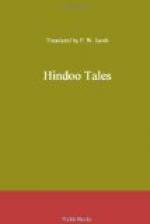“One day when the husband of Dhumini was going about in search of game, he found a man who had been cruelly treated by robbers; they had cut off his hands, feet, and nose, and left him to perish. Having compassion on the poor wretch, he bound up his wounds as well as he was able, and carried him with much difficulty to his hut. There he and his wife nursed him till his wounds were healed, and took care of him afterwards.
“Now such is the depravity of women, that Dhumini fell in love with this poor mutilated wretch, and determined to have him whether he would or no.
“One day her husband came home from hunting, tired and thirsty, and asked her for water. She answered: ’I have a very bad headache, you must go and draw for yourself.’ Then walking softly behind him as he went, she waited till he stooped down over the well, and pushed him in.
“Having thus, as she thought, got rid of her husband, she took the maimed man on her back and carried him till she reached an inhabited country, where there was no famine, telling those who asked her, that this man was her husband, and had been mutilated in that manner by a spiteful enemy.
“She thus became the object of much compassion, and praise, for devotion to her husband, and the king of the country bestowed on her a small pension on which she lived in the city of Avanti. Meanwhile her real husband had managed to climb up from the well, and wandered about a long time, not knowing where his wife was gone. At last he came to Avanti in great distress, and was begging for food when she chanced to see him. Going at once to the king, she said, ’That wicked wretch who mutilated my husband is now here; I have seen him going about as a beggar.’
“Upon this he was immediately seized, and, notwithstanding his protestations of innocence, condemned to death, and led away to execution.




